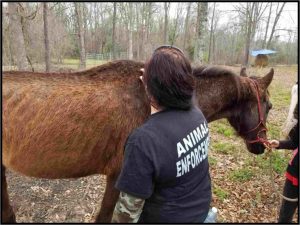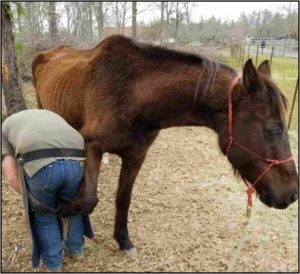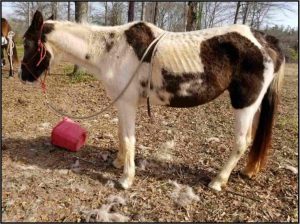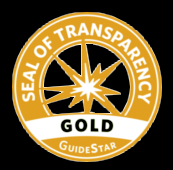This is how it always starts for me…
A phone call on Wednesday afternoon from John Jackson, my Jones County Animal Services Director. “Hey, what’cha DOING?” he says in his kind Southern voice with just a small strain to it – I can tell something is up.
John has been working with me through his law enforcement background for years and is dedicated to helping animals in any way. Our county has recently built a beautiful new Animal Shelter for small animals, which will EVENTUALLY have an area for quarantine and care of large animals, but until now, I have been the outreach for GERL and helping with quarantine, care and finding homes for the various donkeys and horses since I moved here in 2011. He still has to get donations and supplies to do a bunch of fencing and build an outdoor shelter before the County can take anything in. Meanwhile, we work together nicely on these cases.
“Ummmm… not much. What are YOU doing?” I reply, expecting something awful.
“Well, I’ve got the Georgia Department of Agriculture out here with me looking at 2 horses and a pony. Skinny. Really hungry. The person is willing to sign them over immediately. Can you help?” he replies, hopefully.
 What do you do? What do you say? Of course, we will help, and there’s never a GOOD time to have this happen, so we stay prepared as we can to deal with them when they come. My partner, Mark Husted, raises his head at overhearing the conversation and nods “let’s get them.” I am relieved – because he knows now how much work is involved in especially the first week or so of taking these neglect cases in.
What do you do? What do you say? Of course, we will help, and there’s never a GOOD time to have this happen, so we stay prepared as we can to deal with them when they come. My partner, Mark Husted, raises his head at overhearing the conversation and nods “let’s get them.” I am relieved – because he knows now how much work is involved in especially the first week or so of taking these neglect cases in.
“Where is it – I am hitching my trailer now – and let me get some help to that location.” I replied. “Thirty minutes?”
“Sure! I’ll meet you here. Thanks for answering the phone!” he says gratefully.
We swing into action while still talking to him – hitching the horse trailer, gathering equipment for catching (portable fencing), haltering and leading, grain to encourage them to be caught, and safety equipment in case they have no manners (boots, helmet, gloves.) Sunscreen for me. Drinks in case we are there for a long time.
As he signs off the phone, John reminds me “They don’t seem like they have much manners.”
Of course, they have no manners, I think to myself. Seems like they never do. Why? It seems that the people that have these “free” or “cheap” horses probably got them because they have no intrinsic value – in other words, they have never been taught ANYTHING. They don’t know how to be caught easily (without food as a lure), or to lead, stand tied, groomed, handled and relaxed about people, load easily on trailers, be separated from their friends without panicking, or ridden in a way that the rest of us would consider that the horse has any training. Other “value added” would be horses with their up to date Coggins testing, initial and booster vaccinations, deworming, farrier trims of their hooves.
Enough thinking. I gotta focus. While Mark’s driving, I am calling some of my local horse people friends that I know I can depend upon to help with catching and loading the horses. Blaine Rankin and Andi Glasscock quickly offer to help and get moving to meet us. They have stepped up many times to help me with these situations and have even adopted horses – that were able to fit into their program (Overlook Farm in Gray, GA teaches beginner and intermediate riding skills.)
 When we arrive – John meets us and introduces us to the young woman with a 2 year old on her hip, and a teenager standing with her that are relinquishing the horses. The third child is coming home on the bus as we speak. I force a smile, shake their hand, look them in the eye and try to get thru this stiff part of the scenario – hoping they will just go in the house and leave us to do our part. I thank them for doing the “right thing” before it gets any worse, assure them that the horses will be well taken care of and that we will find them new homes. They are obviously relieved, but in my mind, I am thinking “Why do people always worry about that at THIS STAGE? When it is obvious to ANYONE that these horses are starving in their paddock?” Sigh.
When we arrive – John meets us and introduces us to the young woman with a 2 year old on her hip, and a teenager standing with her that are relinquishing the horses. The third child is coming home on the bus as we speak. I force a smile, shake their hand, look them in the eye and try to get thru this stiff part of the scenario – hoping they will just go in the house and leave us to do our part. I thank them for doing the “right thing” before it gets any worse, assure them that the horses will be well taken care of and that we will find them new homes. They are obviously relieved, but in my mind, I am thinking “Why do people always worry about that at THIS STAGE? When it is obvious to ANYONE that these horses are starving in their paddock?” Sigh.
Finally, they go into the house and we set up the trailer for loading horses that possibly have never been taught to go onto trailers. (I always prepare for the worst, and hope for the best.) The big bay gelding comes right to the gate for a handful of grain and I get a halter on him, move him thru the gate, get a few photos for documentation purposes, and Mark leads him straight onto the trailer. MERCIFUL prayers be answered! We make a quick decision to go ahead and take him to the quarantine facility while waiting on our help, then come back for the other 2. He’s perfectly okay with eating hay from a nibble net while we drive, we get him unloaded safely and into the quarantine paddock and turn around for the other two. When we leave – mine are lined up at their fence on the other side of the property checking out the new horse, the bay is busily eating anything he can find of the new spring nibbles.
 When we return to the property, I document their “home” they have been in for the last couple of months carefully. They have eaten EVERYTHING that was possible to eat – the bark on the trees, the branches of the bushes, every green or edible thing in their 2 acre paddock is down to the dirt. That is when Mark ventures a comment with the horror of realization, “There’s no poop in this whole paddock. Where is the poop?”
When we return to the property, I document their “home” they have been in for the last couple of months carefully. They have eaten EVERYTHING that was possible to eat – the bark on the trees, the branches of the bushes, every green or edible thing in their 2 acre paddock is down to the dirt. That is when Mark ventures a comment with the horror of realization, “There’s no poop in this whole paddock. Where is the poop?”
I have to explain to him that when horses are very hungry, they will actually eat their poop as well as the dirt – to attempt to gain ANY nutrition from it. Coprophagy is NORMAL in young horses, that is how they inoculate their guts with the bacteria and organisms from their mother’s manure, that helps them break down the milk, grain and grass for nutrition. However, it is NOT normal in older horses. “Ewwwww….” he sighs with disgust. “I was afraid you were going to say that.” When we look at their poop (thank goodness they were pooping SOMETHING) in the trailer – it was black, tarry and smelled AWFUL – more signs of the lack of nutrition and fiber.

One Comment
My horse Charlotte was brought to an impound facility back in 2012 on Flat Shoals Rd. during my 1 yr. there of volunteering. The rumor was the impound was closing soon so I had given my notice of leaving. On my last volunteering evening I arrived at the facility to find a new rescue. She was like many others extremely skinny, big belly from worms, terrible skin & hoof issues but Oh! what a lovely face and SO SWEET. I had lost my heart horse & “love of my life” 2 yrs. prior to starting to volunteer w/the Dept. of Agriculture and was NEVER getting another horse. Something or someone from above seemed to say to me “help this poor girl you all NEED each other”. I was blessed a second time with a WONDERFUL friend/companion for 11 years until last November when she met w/a horrendous, tragic accident at the boarding facility where she had spent 9-10 yrs. I am now 71y/o and missing having a “best friend.” I will not be getting another horse but cannot say enough good things about the people affiliated w/the Dept. of Agriculture Equine division. I’m not familiar w/GERL yet, but I feel a “rescue” animal is well worth taking a chance on and helping. Charlotte was one the BEST things to ever bless my life. I miss her EVERY day and CHERISH every memory. Please if you’re able consider helping and loving one of these WONDERFUL creatures.